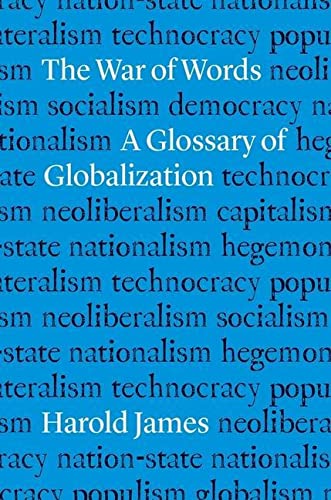Benjamin Bennett-Carpenter
DOUBLE BOOK REVIEW
A Couple Fairly Recent Words: Capitalism & Globalization
1. The War of Words: A Glossary of Globalization by Harold James
2. Capitalism: The Story Behind the Word by Michael Sonenscher
Reviewed by Benjamin Bennett-Carpenter Two fairly recent books on my bookshelf stand out for their focus on words connected to global studies. Those words are “globalization” and “capitalism”. Those books are The War of Words: A Glossary of Globalization by Harold James (Yale, 2021) and Capitalism: The Story Behind the Word by Michael Sonenscher (Princeton, 2022).
Two fairly recent books on my bookshelf stand out for their focus on words connected to global studies. Those words are “globalization” and “capitalism”. Those books are The War of Words: A Glossary of Globalization by Harold James (Yale, 2021) and Capitalism: The Story Behind the Word by Michael Sonenscher (Princeton, 2022).
I go first to James because the project seems like something we definitely all need: a working “glossary” for globalization. The War of Words is organized in chapters running through James’s selected terms, including: capitalism, socialism, democracy, nationalism, hegemony, multilateralism, populism, globalism, and globalization, among others. James is an historian of economics, so his terminology is centered in economics; and the orientation is toward tracing the terms’ histories roughly from the 19th century up to the present. James provides a possible useful orientation and starting point toward globalization discourse.
Meanwhile Sonenscher is also an historian but with a focus on political thought. Capitalism is organized in two main parts of “problems” and “solutions”. The “problems” section distinguishes between capitalism and commercial society; positions capitalism within the history of political thought; elaborates on the historical connection between capital/capitalism and funding war through royal or public debt; among other issues such as work/labor. The “solutions” section is not current but, rather, historic proposals for solutions to the promises and problems surrounding capitalism. Each chapter here is centered around key figures starting with Marx and Adam Smith, and proceeding with Hegel, David Ricardo, and Lorenz von Stein.
A central aim and conclusion of Sonenscher’s book is “to try to explain why the distinction between capitalism and commercial society is worth making” (168; cf. 3ff.). That is, commercial society does not automatically mean capitalism; and capitalism is not the same thing as a commercial or market society (16; cf. James, 20). At the same time Sonenscher thinks that, rather than capitalism, it is the division of labor that is enduring (14, 172).
As Sonenscher describes, the terminology of capitalism emerged out of discussions of “liberty” around the July 1830 revolution in France (24-25). He traces the earlier term “capitalist” to the 18th century as originating in the effort to fund war through “royal and public debt” (38; cf. James, 22). A capitalist was one who provided funding for war efforts. Within this historical context, the state influenced the development of capital even as capital influenced the development of the state (31ff). It was state first, then capitalism (for war). Sonenscher traces the term back to the French in 1850: “capitalisme” (25) – specifically Louis Blanc in Organisation du Travail [“The Organization of Labor”] (x-xi). The addition of -ism to capital – making capital-ism – indicated a whole system had emerged. Capitalism over time came to be understood as a whole complex system, a whole way of thinking and doing things (ix).
From here we turn to “globalization”. This is one term amidst James’s menu of terms organizing each chapter. Distinguishing it from “globalism” and also from earlier ideas of globalization, James points to Italian origins (“mondializzazione”): the “obscure left-wing publication [Sinistra Proleteria discussing ‘imperialism’] is the true first-known reference to globalization in its contemporary sense….” (207).  Simply, globalization is the “movement of people and of goods” (292). However, James sees also that globalization becomes a “mindset” – “a cultural or…psychological phenomenon” (210). Here his suggestion of a shift from “financial capitalism” to an emerging “information capitalism” (40) is enlightening. Discussions of “information economy” fit relatively neatly with discussions of globalization, though they remain distinct. Ultimately, understanding what James calls “complex global value chains” (219) may be the contemporary holy grail.
Simply, globalization is the “movement of people and of goods” (292). However, James sees also that globalization becomes a “mindset” – “a cultural or…psychological phenomenon” (210). Here his suggestion of a shift from “financial capitalism” to an emerging “information capitalism” (40) is enlightening. Discussions of “information economy” fit relatively neatly with discussions of globalization, though they remain distinct. Ultimately, understanding what James calls “complex global value chains” (219) may be the contemporary holy grail.
In all this, while both books discuss socialism, further attention is needed to it, along with communism in its current form in the Chinese Communist Party. Hybrid complications of multiple -isms appear to be at play around the world, including within various states such as China and the United States of America, among others in Europe, Asia, Africa, and the Americas. Meanwhile, James does point to “crony capitalism” (16), yet the oligarchic and plutocratic dynamics of present regimes appears mostly overlooked. To broaden the context, a few other places I look on my bookshelf include, Jeffrey A. Winter’s Oligarchy (Cambridge, 2011), Xi Jinping’s The Governance of China (Foreign Language Press, 2014/2018ff.), and Martin Wolf’s The Crisis of Democratic Capitalism (Penguin, 2023).
Finally, more attention by all accounts is needed on everyday people the world over – actual people – and how they actually are getting along. Still, I find James’s and Sonenscher’s contributions to be quite valuable in the rich aspirational project of trying to understand what in the world is going on today.
The War of Words: A Glossary of Globalization by Harold James (Yale, 2021), 354 pages
Capitalism: The Story Behind the Word by Michael Sonenscher (Princeton, 2022), 225 pages
 Ben Bennett-Carpenter teaches at a university in the Great Lakes region of North America, and coaches at Sollars & Associates, Inc. He is the author of Death in Documentaries: The Memento Mori Experience (Brill | Rodopi, 2018) and Explaining Jesus: An Interdisciplinary Exploration of a Phenomenon (Lexington Books | Rowman & Littlefield, 2019).
Ben Bennett-Carpenter teaches at a university in the Great Lakes region of North America, and coaches at Sollars & Associates, Inc. He is the author of Death in Documentaries: The Memento Mori Experience (Brill | Rodopi, 2018) and Explaining Jesus: An Interdisciplinary Exploration of a Phenomenon (Lexington Books | Rowman & Littlefield, 2019).
Back to Meridian 5

